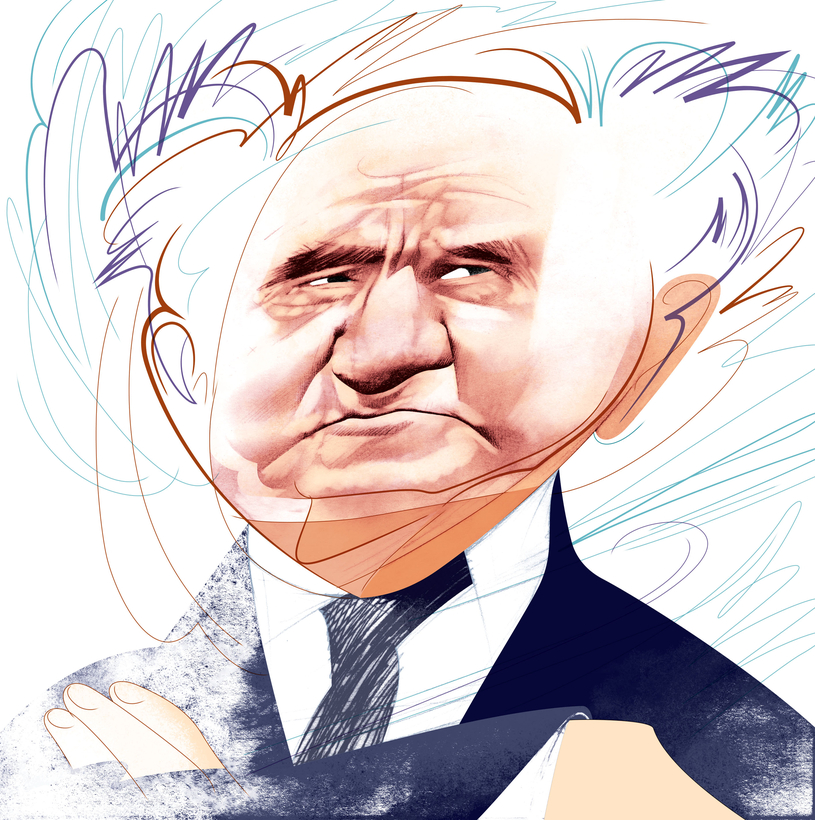Of all my books, David Ben-Gurion’s biography has been the most challenging to write. Israel counts among the most dramatic success stories of the 20th century, but today it still struggles with some of the problems it inherited from its founding father, including, most notably, the absence of peace.
Ben-Gurion did not believe that peace was possible. As early as 1919—almost 30 years before the state of Israel was founded—he stated:
“Everyone sees the difficulty of relations between Jews and Arabs, but not everyone sees that there is no solution to that question. There is no solution. There is an abyss and nothing can fill that abyss....We want Palestine to be ours as a nation. The Arabs want it to be theirs, as a nation.... I don’t know what Arab would agree to Palestine belonging to the Jews.”

Ben-Gurion’s conviction that the conflict could not be resolved peacefully grew stronger; to the end of his days in 1973 he believed that it could at best be managed. From war to war, and with every peace initiative having resulted in failure, a vast majority of Israelis have also come to conclude that peace with the Palestinians is not a realistic option, at least not in our time.
First Person
In the spring of 1968, I interviewed Ben-Gurion at his desert kibbutz, and it was one of the deepest experiences of my life. I was 23; he was almost 83. Talking about his youth in Poland, he said that as a boy of three he already knew that he would go to Palestine, because even then he had been an ardent Zionist. At 14, he founded a Zionist youth organization. Hence, it would seem that, beginning at a very young age, Zionism had become everything to him—the core of his personality, the essence of his identity. Zionism for Ben-Gurion meant the quest for an independent Jewish state in Palestine at any cost; the cost was quite high, and it still is.
For many years Ben-Gurion has been admired as an iconic figure standing on a high pillar, carved in stone or cast in steel. I remember him in a pensive mood, preoccupied with the past, sad, and very lonely. His wife, Paula, had just died. I shall never forget how he suddenly said, “I wanted another child—Paula didn’t.”
Beginning at a very young age, Zionism had become everything to Ben-Gurion—the core of his personality, the essence of his identity.
Working on this book, I was able to use previously unreleased archival material, as well as Ben-Gurion’s own personal diary. It reflects not only the most significant events in the story of the nation he led, but also some of the most intimate moments of his life, including his sudden transitions from deep depression to uncontrollable elation and, at times, irrational outbursts, accompanied by ideas and actions that allude to more than a grain of eccentricity. For instance, while on an official visit to Burma in 1961, he took time off to study Buddhism, hoping to find out whether the Jews are in fact God’s Chosen People. He repeatedly consulted a fortune-teller; described in his diary a U.F.O., which he once believed to have detected in the sky; and, eventually, had himself photographed in a bathing suit, standing on his head, in an effort to escape old age.
My Ben-Gurion is neither a saint nor a villain, but an amazingly complex character whose ability to lead his nation with both zealous conviction and realistic pragmatism puts him in the company of Lenin and Churchill.
Tom Segev is an Israeli historian and the author of several books, including One Palestine, Complete: Jews and Arabs Under the British Mandate. A State at Any Cost: The Life of David Ben-Gurion will be published by Farrar, Straus and Giroux on September 24

